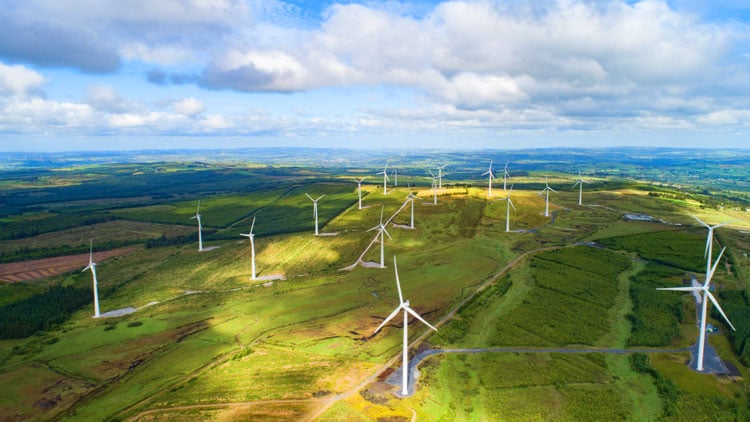Exploring the tax implications of the EU’s Clean Industrial Deal
On 26 February 2025, the European Commission unveiled the Omnibus Package, a set of proposals aimed at simplifying EU rules, boosting competitiveness and unlocking investment capacity. A key component is the Clean Industrial Deal (CID), which focuses on raising funds and driving innovation to accelerate decarbonisation and foster a circular economy. The CID strategically focuses on energy-intensive industries and the clean-tech sector. It also identifies six key business drivers: affordable energy, lead markets, financing, circularity, global markets and skills, essential for a sustainable industrial ecosystem.
Tax policy is often cited as a potential lever to influence behavioural change and to mobilise the investment that is needed to fund the clean transition and to meet our climate targets. It is interesting that tax policy is noted as a key lever within all six key business drivers (a combination of the “carrot and stick” approach). It is also noteworthy that Commissioner Hoekstra (European Commissioner for Climate, Net Zero, Clean Growth and with responsibility for Taxation) at the recent EU Tax Symposium in Brussels stated that decarbonisation is a priority in the EU competitiveness agenda and that tax measures are needed to help energy intensive industries to decarbonise.

Tax as a lever to achieve objectives under the CID
We have highlighted key areas where tax features within the CID:
Affordable energy
The European Commission recognises securing affordable energy as crucial for industry competitiveness, with tax playing a role via the Energy Taxation Directive. Negotiations to revise the Energy Taxation Directive have been ongoing since July 2021 and aim to ensure tax frameworks do not incentivise the use of fossil fuels and are more conducive to electrification. The CID emphasises the urgency of concluding these negotiations.
For short-term relief, member states are encouraged to reduce taxation levels on electricity, including eliminating levies on electricity where those levies are used by governments to fund initiatives that are not connected to the energy sector. The European Commission will issue recommendations to guide member states on how to effectively lower electricity taxation in a cost-effective manner.
Lead markets
Building a business case for decarbonised products is central to the CID. The proposed Industrial Decarbonisation Accelerator Act (Q4 2025) will introduce resilience and sustainability criteria to foster clean European supply for energy-intensive sectors. This includes a voluntary carbon intensity label for industrial products. Such labels should allow industrial producers to distinguish the carbon intensity of their industrial production and to benefit from targeted incentives.
It is suggested that these labels could be used by member states to design tax incentives and other support schemes in line with state aid rules. This approach aligns with our climate-related pre-budget submissions, suggesting targeted tax incentives linked to greenhouse gas (GHG) emission reductions.
Financing
Leveraging public and private capital is crucial for funding the significant investment needed for the European clean transition. Some key initiatives proposed include:
- Creation of the Industrial Decarbonisation Bank (Q2 2026, €100bn funding) - this is aimed at the decarbonisation of companies within the scope of ETS (a €1bn pilot auction will launch in 2025);
- Launch of the EU Competitiveness Fund - this will enable national governments to set up funding programs to facilitate sustainable investments (aimed at projects with defined criteria for EU added value in clean tech manufacturing, infrastructure and industrial decarbonisation); and
- TechEU investment programme by the European Commission and European Investment Bank - this aims to help bridge the financing gap for innovative technologies including clean tech and energy storage.
From a tax perspective, the European Commission recommends member states support clean business through corporate tax systems, suggesting:
- Accelerated depreciation for clean technology assets; and
- Tax credits for businesses in strategic sectors for the clean transition.
Helpfully, the European Commission mentions that to the extent these measures involve state aid, the new state aid framework will integrate these instruments into its compatibility rules.
These measures, if enacted, should help to encourage businesses to invest in decarbonisation through the use of tax incentives to partially offset high upfront investments. The use of tax credits should also encourage more private investment into decarbonised products and practices.
Ireland should proactively review these proposals and consider tax policy changes to encourage faster decarbonisation of the Irish economy, increased investment in decarbonisation measures and position Ireland as a clean tech innovation leader.
Circular economy
The European Commission recognises the importance of scale and a single market for waste, secondary raw material and reusable materials to promote circularity. VAT has been identified as a potential lever, with a commitment to review the rules on the second-hand scheme contained in the VAT Directive by Q4 2026 to address the issue of embedded VAT in second-hand products (Green VAT initiative).
Global markets
European clean industrialisation requires global partnerships and open, rules-based trade with access to third markets for goods and capital. Tax can play a role here in seeking to protect a global level playing field. This includes:
The Carbon Border Adjustment Mechanism (CBAM)
The CBAM, operational since 2024 (reporting only), seeks to ensure that the EU’s efforts to reduce carbon emissions are not undermined by the importation of carbon intensive products into the EU. From 2027, importers of certain carbon intensive products must purchase CBAM certificates to equalise carbon costs between imported and EU-produced goods. Recognising the complexity in compiling CBAM returns, especially regarding supplier data, the European Commission proposes to simplify administration in 2025 while continuing to incentivise global carbon pricing. A comprehensive review of CBAM in Q3 2025 will explore extending CBAM to other EU ETS sectors at risk of carbon leakage, to downstream products and indirect emissions with the aim of closing potential loopholes.
The Foreign Subsidies Regulation (FSR)
Effective July 2023, the FSR impacts businesses operating in the EU, including non-EU based multinational companies. It requires European Commission notification and approval for M&A activities or public procurement contracts above certain thresholds if non-EU governments provide 'financial contributions' (including grants, export subsidies or tax credits) that could unfairly advantage companies against EU competitors. By Q1 2026, the European Commission will adopt guidelines on key FSR concepts, including assessing foreign subsidy distortions and clarifying the circumstances in which mergers, which do not meet the thresholds but pose a risk to the level playing field in the single market, may be reviewed. The European Commission has also stated that it will continue FSR ex officio investigations in strategic sectors, such as the ongoing probe into Chinese wind turbine suppliers. For more details on FSR application, see our recent tax policy alert.
Skills
The European Commission aims for an inclusive clean transition. As part of the General Block Exemption Regulation review, it will consider whether state aid rules can be updated to provide better incentives to industry to invest in upskilling, reskilling, quality jobs and recruitment of workers for a just transition. Examples in an Irish context could include different PRSI rates and double tax credits for green upskilling.
For more on ensuring a just transition, see our recent article titled Enabling a Just Transition — Why Taxation has a Vital Role to Play.
Key actions businesses can take today
- Stay informed on tax policy developments
Monitor evolving climate related tax policies, including developments as a result of the Clean Industrial Deal (CID) proposals. Keep abreast of changes in areas such as energy taxation, carbon pricing and tax incentives for clean technology investments. This knowledge will help your business anticipate and adapt to new regulatory landscapes, potentially gaining a competitive edge in the transition to a low-carbon economy. - Review and adapt decarbonisation strategies
Assess your current decarbonisation efforts in light of the CID’s proposals. Consider how potential tax incentives, such as accelerated depreciation for clean technology assets, might influence your investment decisions. Develop a roadmap that aligns your sustainability goals with emerging tax opportunities to maximise both environmental and financial benefits. - Prepare for enhanced reporting requirements
Strengthen your data collection and reporting systems to meet evolving compliance needs, particularly for areas like the CBAM and FSR. Robust reporting capabilities will not only ensure compliance but also position your business to capitalise on potential incentives and avoid penalties. - Engage in policy discussions
Actively participate in industry forums and policy consultations related to the CID (and other climate related tax measures). Your insights can help shape policies that are both effective for climate action and practical for businesses. - Explore circular economy opportunities
Investigate how your business can benefit from the proposed circular economy initiatives, including potential VAT changes. Assess your products and processes for circularity potential and consider whether tax incentives might support transitions to more sustainable practices. This proactive approach can open new revenue streams and enhance your company’s sustainability profile.
We’re here to help you
Our tax experts are uniquely positioned to help you navigate the complex intersection of tax policy and sustainability. Our team can provide tailored insights on how the Clean Industrial Deal’s proposals may impact your business, identify potential tax opportunities and risks, and help you to develop strategies to optimise your position in the evolving regulatory landscape. We are here to help if you encounter barriers to decarbonisation or circular economy initiatives, and you believe that tax policy could be a lever to help address some or all of the barriers. It is important that there is early engagement and collaboration with governments and if applicable at EU level to ensure that all relevant business concerns are taken into account
Contact us today to explore how we can support your business in turning climate-related tax challenges into opportunities for growth and innovation.











Menu